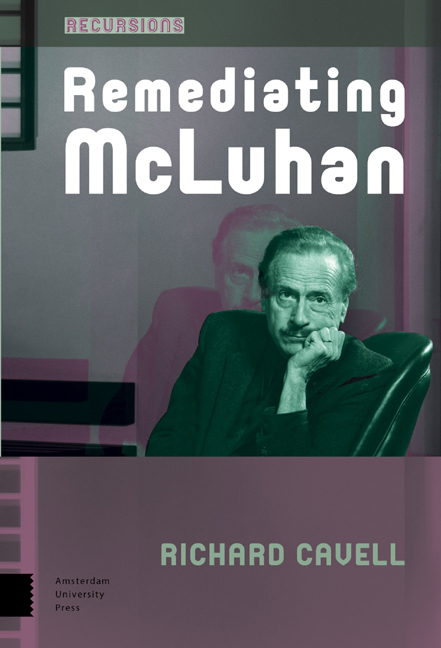Book contents
- Frontmatter
- Dedication
- Contents
- Introduction
- List of sigla
- I
- Re: Mediation
- 1 Beyond McLuhanism
- 2 McLuhan and the Question of the Book
- Embodiment as Incorporation
- 3 McLuhan and the Body as Medium
- 4 McLuhan, Tactility, and the Digital
- 5 Mechanical Brides and Vampire Squids
- Empathic Media
- 6 McLuhan: Motion: e-Motion: Towards a Soft Ontology of Media
- 7 Re-Mediating the Medium
- Determining Technology
- 8 McLuhan, Turing, and the Question of Determinism
- 9 Angels and Robots
- Being Mediated
- 10 Marshall McLuhan’s Echo-Criticism
- 11 McLuhan and the Technology of Being
- II
- 12 The Tragedy of Media: Nietzsche, McLuhan, Kittler
- Coda: On the 50th Anniversary of Understanding Media
- Notes
- Works Cited
- Index
Coda: On the 50th Anniversary of Understanding Media
Published online by Cambridge University Press: 12 December 2020
- Frontmatter
- Dedication
- Contents
- Introduction
- List of sigla
- I
- Re: Mediation
- 1 Beyond McLuhanism
- 2 McLuhan and the Question of the Book
- Embodiment as Incorporation
- 3 McLuhan and the Body as Medium
- 4 McLuhan, Tactility, and the Digital
- 5 Mechanical Brides and Vampire Squids
- Empathic Media
- 6 McLuhan: Motion: e-Motion: Towards a Soft Ontology of Media
- 7 Re-Mediating the Medium
- Determining Technology
- 8 McLuhan, Turing, and the Question of Determinism
- 9 Angels and Robots
- Being Mediated
- 10 Marshall McLuhan’s Echo-Criticism
- 11 McLuhan and the Technology of Being
- II
- 12 The Tragedy of Media: Nietzsche, McLuhan, Kittler
- Coda: On the 50th Anniversary of Understanding Media
- Notes
- Works Cited
- Index
Summary
The 26 chapters that comprise the second half of Understanding Media proclaim for media a cultural impact equal to that of the alphabet, while suggesting that to understand the alphabet as a medium asserts a claim to a new philosophical paradigm—a media philosophy. The seven opening chapters of the book propose media as the trivium and quadrivium of a posthumanistic epistemology. Behind the alphabetic quotient hovers the digital as a universal mode of translation. And the subtitle places mediation in complex relationship to the bios.
McLuhan announced Understanding Media at the end of The Gutenberg Galaxy as that book's companion piece: ‘The new electric galaxy of events has already moved deeply into the Gutenberg galaxy. Even without collision, such co-existence of technologies and awareness brings trauma and tension to every living person.’ Alluding to the famous scene (book 5, chapter 2) in Victor Hugo's Notre-Dame de Paris where we are told that ‘ceci tuera cela’—the book will displace the cathedral—McLuhan continues: ‘Our most ordinary and conventional attitudes seem suddenly twisted into gargoyles and grotesques. […] These multiple transformations, which are the normal consequence of introducing new media into any society whatever, need special study and will be the subject of another volume on Understanding Media in the world of our time.’
It is well-known that Understanding Media grew out of McLuhan’s Report on Project in Understanding New Media. In the transition from the Report to the book, however, media took on a breadth not evident earlier. As McLuhan wrote to his former student Walter Ong in February of 1962, ‘I expect to add to the present form [i.e. the Report] of Understanding Media several media like money, railways, ships and ‘planes and cars—in fact, all of those externalizations of our bodily functions and perceptions which cause all human technology to exist in the ablative case’ (Letters, p. 283). McLuhan was also concerned with the transition from visual to acoustic space, and thus the two books form a chiasmus, The Gutenberg Galaxy focusing on the transition from orality to literacy and Understanding Media from print culture to the acoustic.
- Type
- Chapter
- Information
- Remediating McLuhan , pp. 149 - 152Publisher: Amsterdam University PressPrint publication year: 2016



